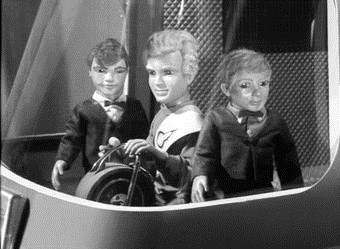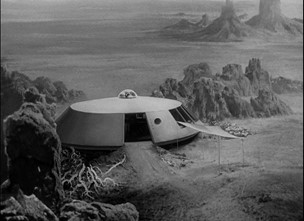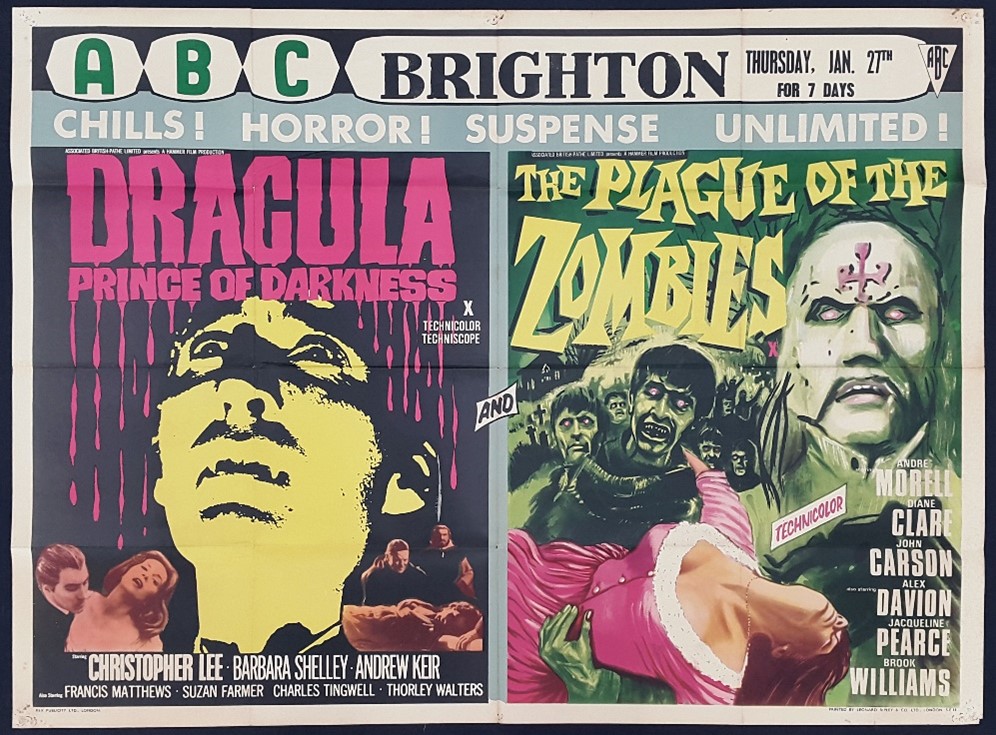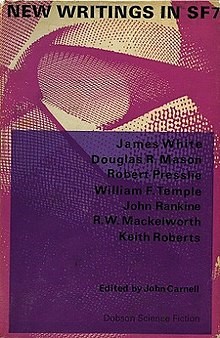
by Mx. Kris Vyas-Myall
On Saturday 29th January, Science Fiction and Fantasy fans in England were spoiled for choice in their viewing options.

On the BBC you could see the final part of Doctor Who's recent epic Dalek story. Later in the evening you could see the latest episode of US magical sitcom Bewitched.

Over on ATV London the evening stated with Gerry Anderson’s Thunderbirds, then there was aired the film version of Quatermass II and the evening ended with new horror anthology series Mystery and Imagination, adapting a J. Meade Falkner’s story The Lost Stradavarius.

When ABC Midlands also aired Mystery and Imagination, you could also see a golf themed adventure of The Avengers, along with a new episode of Voyage to the Bottom of the Sea.

Due to the weird TV areas, I can also get a weak Anglia signal. In addition to the above, they started the evening with episodes of The Flintstones and Lost in Space.

Whilst, on the radio, The Home Programme was continuing their serialisation of Neil M. Gunn’s novel Green Isle of the Great Deep and in the cinema, you could still see Hammer’s most recent double bill, Dracula: Prince of Darkness and Plague of the Zombies.
When at the end of the last decade we would be waiting months for a single science fiction episode of ITV playhouse, this is a big change for the SF fan.
What also came through to me on that weekend is John Carnell’s latest New Writings:

Invader by James White
James White should need no introduction to most SF fans, but, though he was a regular contributor to New Worlds up to Carnell’s final issue, he has not had anything published in the new British magazine landscape.
Here he returns with the first Sector General tale since Star Surgeon came out in ’63. This one deals with an interesting problem, where one of their senior physicians, Mannen, may have killed a patient through careless action. Conway, however, is determined to investigate and prove his innocence.
Although there are almost a dozen other Sector General tales printed you can easily pick this one up straight away without foreknowledge and the medical mystery aspect of this story is handled well and kept me engaged for the whole length.
Four Stars
This is not his only return to the SF scene, he also has a new novel out (see below for my review of that).
The Man Who Missed the Ferry by Douglas R. Mason
Usually Mason publishes as John Rankine, but with another story under that name in this issue (see below), we are getting his first non-pseudonymously published story. Given that he has his first novel coming soon under the Mason name, it will be interesting to see which he becomes better known for.
On to the actual piece in this issue: it is a bit of a puzzling one. Arthur Sinclair is a shipping clerk who loses his memory and decides to take a walk across the river Mersey, literally walking across the water without a second thought. More details and powers of his emerge as the story goes on but things do not end up going entirely well.
The whole thing reads more like a description of someone’s dream than a science fiction tale. Too much that is unexplained and seems to happen for reasons that make neither narrative nor thematic sense.
Two Stars
The Night of the Seventh Finger by Robert Presslie
Returning after his confounding piece in the last anthology he does something a little more traditional here.
Sue Bradley travels from the boring Eastwood New Town to the city for an evening of entertainment. There she meets a mysterious man, who may be mad or from the future.
The topic is a bit of a cliched one but what I did appreciate is the focus on the boredom of teenagers in the new planned towns, an area that is very contemporary and unmined by SFF writers in Britain, who tend to either prefer city centres or isolated villages.
Three Stars
Six Cubed Plus One by John Rankine
At Goresville Comprehensive school they have setup a cube shaped annex to house an “automated section” for study groups to use. However, it is actually an experiment in creating a new form of life. As you would expect, things go wrong,
This feels more like a pitch document for an ATV children’s television serial than a modern piece of science fiction. Overall, I didn’t feel there was much to it and I had real trouble maintaining my interest to keep reading. Clearly Carnell likes Rankine\Mason, but I am yet to be convinced by his writings.
Two Stars
Coco-Talk by William F. Temple
Temple has been largely absent from the British magazines for a while, publishing pieces in America which often have a quite old-fashioned sensibility. This, on the other hand, feels like a bit more of a step forward.
It concerns the Minister of Cultural Exchange going to Venus as a spy on the Venusians. The problem is their tendency to speak in Coco-Talk, a form of shocking double-speak. The whole thing then goes into a form of interplanetary espionage which is, in itself, a quite interesting little escapade.
I do have questions about whether the choice of name is meant to evoke non-European cultures, and, if so, if we are meant to read the text as colonialist or an anticolonial satire. It seems to go so close to the line on this point that I struggle to determine intent.
Three stars
A Touch of Immortality by R. W. Mackelworth
In the future there has been developed a means to send bullets into the far future. This is to be used to grant immortality to President Strom. However, there is a method of physical immortality available, but who would want that?
A middling piece on the nature of immortality and largely forgettable.
Two stars
Manscarer by Keith Roberts
Did you really think we would get away from Mr. Roberts? No chance of that!
In this final novelette, a colony of artists have been building a series of giant sculptures, but when a death occurs the colonists begin to question their purpose.
I found this a real struggle to get through, the message had been done many times before and the treatment of women here was terrible.
If you want better treatment of the nature of art and artist I would instead recommend Leaf by Niggle by J. R. R. Tolkien in Tree and Leaf.
Two stars
So this was not an exceptional example of the series, with only one real standout and the rest merely being adequate to average. Carnell also continues to fail to branch out in his author selection. The results tend to be variable, but maybe it is worth taking the lead from If and reserving a few pages for newer writers. Carnell may be a steady hand at the helm but it would be great to see him venture out of his lagoon.
The Watch Below by James White
Cover by George Zeil

Whilst next month the British hardback is coming out, Ballantine’s edition is already available in the US and I managed to acquire one early.
A few years ago James White was one of the most celebrated British SF authors and seemed to be going from strength to strength. With his Sector General tales being published in the US and Second Ending becoming a Hugo Finalist. But he had nothing new released last year and only Open Prison the year before.
Thankfully Carnell seems to have dragged him back to the SF field once again (White describes Carnell in the dedication as “Friend, Agent, Slave-driver”) with a most unusual take on familiar concepts.
In 1942 the tanker ship The Gulf Trader, sinks in a convoy after a torpedo attack, miraculously those on board find themselves in an air bubble on the ship and begin to work out how to survive down there in their new isolated home. Something they have to do for generations.
Meanwhile, the Uthans, an aquatic species, have left their now uninhabitable planet on giant starships, heading towards a distant world whose surface is mostly water, using freezing technology to keep their crew and passengers alive for the whole journey. However, it turns out multiple freezings and unfreezings causes brain damage. So the only solution is for a selection of the crew to stay unfrozen and have their descendants continue leading the voyage for them.
As you can tell, this is a tale of two accidental generation ships, one of air breathers trapped underwater, one of water breathers travelling through space. The stories, in fact, do not connect until the penultimate chapter so what we are left with is an interesting case of having the themes parallel each other without directly interacting for the most part. This is a trick I am familiar with from literary fiction, but not one I recall seeing in science fiction before.
In fact, I wonder if this is an attempt to keep up with the changing nature of science fiction. I would say I have seen three camps of SF fans: Pulp readers (who want adventure and splashy concepts), Hard SF fans (who want real science and problem stories) and New Wavers (who want experimentation and literary flourishes). This book seems to strive to have something for everyone. It has the bold ideas of an underwater home and an aquatic spaceship. White then also goes to pains to try to explain the science of these ridiculous concepts, having pages of the different crews explain how they will eat, breathe, reproduce, etc. But then adds a lot of literary techniques whilst also touching on areas often considered taboo by some SF writers, such as menstruation, death in childbirth, and orgies.
As you can probably tell this is an ambitious novel trying to do a lot of different things and please a wide audience. The big question is, of course, does White manage to pull it all off? Unfortunately, not entirely. His usual easy readability is lost as he attempts to establish his worlds and I found myself wanting to put down the book as he spends paragraphs discussing the necessary quantities of plant growth.
Even worse, although the decision to make the two crews not meet until the end of the novel is an interesting idea, it results in the ending seeming incredibly rushed, with White moving from a slow paced discussion to a frantic attempt to wrap up the story before he runs out of words.
I can’t help but feel this book too ambitious and in search of a larger page count. In the end I found myself admiring The Watch Below more than enjoying it.
Three Stars
The Lost Perception by Daniel F. Galouye

From a Northern Irish writer first published in the US, to an American writer being first published in the UK. However, as far as I know, there is no release date from The Lost Perception yet from Bantam. I am not sure why this is, but I am still glad to be able to get another book from one of the most interesting North American writers.
After his detour into the Philip K. Dick-esque Simulacron-3, he returns to another Post-Disaster tale, reminiscent in many ways of The Lords of Psychon.
As usual Galouye throws a lot at us. In 1983 those known as screamers begin to emerge, people have violent seizures they are not able to escape from. By the mid-90s it is an epidemic causing an almost societal collapse. Gregson, an agent for the Security Bureau (what remains of the former United Nations) is sent to look into the situation with the screamie epidemic.
This is only the start of what is happening. There has also been the appearance of an alien race known as The Valorian, who appear to be trying to infiltrate society. Further, the title of book itself refers to zylphing, a form of ESP that begins to become unlocked for humans.
The whole thing is a very fast paced thriller that throws around concepts and ideas as if they were rice at a wedding. I have read through it a few times now and I am still not sure I fully understand everything that was going on. There are layers of double crosses and conspiracies that made my head spin trying to keep up with all of them.
As such I feel explaining more of the plot is a fool’s errand. Also, with so much going on the characters felt very flat to me, merely serving to be moved around like pieces on a chess board. Helen in particular feels less like a person as a plot device to keep the story going. The attempts to make it feel more global also fall flat, with them talking about “a turbaned Oriental” and a “robed African”.
Two areas where it does shine are in the concepts and the pacing. The story does not let up for one page before you are moving on to the next bizarre occurrence or new piece of information. At the same time this post-disaster world felt very lived-in and believable that this kind of organisation would spring up in the face of such a threat.
So, whilst I was able to read it fast and feel it was an experience, I was often lost. It may be perceptive, but of what I remain unsure.
Three Stars
The Journey is once again up for a Best Fanzine Hugo nomination — and its founder is up for several other awards as well! If you've got a Worldcon membership, or if you just want to see what Gideon's done that's Hugo-worthy, please read his Hugo Eligibility article! Thank you for your continued support.


